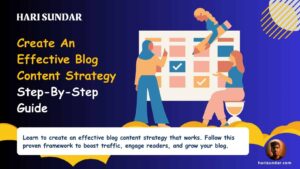11 Epic Benefits of Blogging You’ll Regret Skipping in 2024

Meta Description: Discover 10+ benefits of blogging in 2024, from boosting your online presence to building your personal brand and making money. Start your blog today!
“I never thought a laptop and a health setback would change my life.” That’s how my blogging journey began in 2019, transforming me from fighting health issues to being a digital entrepreneur.
Feeling lost after surgery, I stumbled into the world of blogging. Little did I know, I was about to unlock the doors to opportunities! It wasn’t just about filling time – it became my gateway to build my blogging career.
Did you know businesses with blogs get 67% more leads than those without? That’s not just a number – it’s a game-changer! Whether you’re aiming to boost your business, share your passions and knowledge, or even make money blogging, you’re in the right place to get started!
Starting a blog isn’t just about writing – it’s about carving out your unique corner of the internet. And trust me, the benefits are mind-blowing!
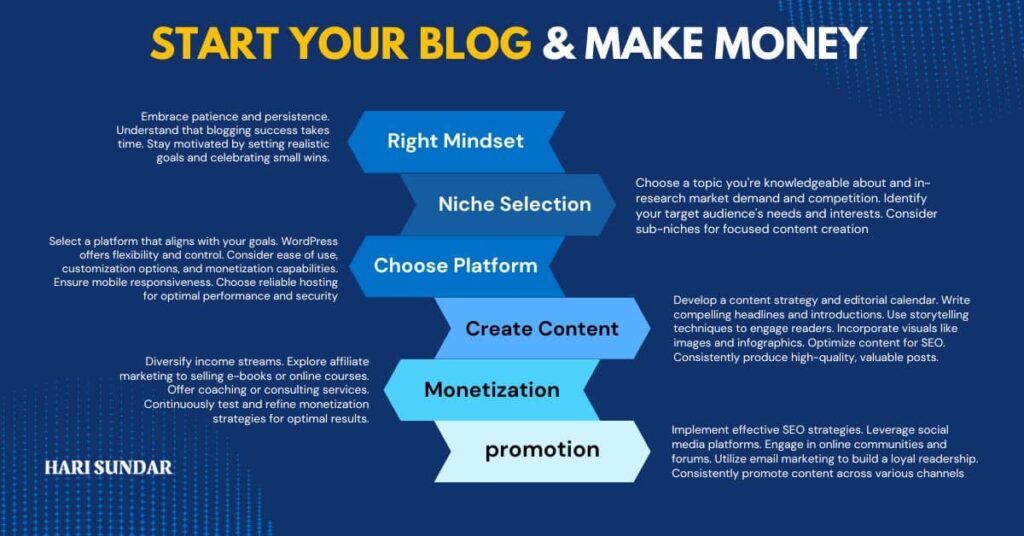
From improving your SEO to career opportunities, I’m about to spill the tea on the top 11 benefits of blogging that could transform your online presence.
So, here’s a glance at what we’re going to cover:
- 🚀 Boost your online visibility by implementing the right SEO strategy
- 💼 Build your personal brand and open doors to exciting opportunities
- 💰 Create passive income streams (yes, you can make money blogging!)
- 🤝 Connect with like-minded people and grow your network
- 📊 Gain valuable insights about your audience to guide your business decisions
- 🎯 Develop a living portfolio that can supercharge your career
Ready to see how blogging can level up your digital game? Hang tight – we’re diving into a world where your words can literally change your life!
1. Boost Your Online Visibility and SEO
Imagine your blog as a megaphone for your ideas. That’s what it does for your online presence – it makes you easier to find and harder to ignore!
When you blog regularly, you’re basically rolling out the welcome mat for search engines. They love new content, and each post gives them something fresh to show people searching for topics you write about.
But here’s the thing – it’s not just about writing tons of posts. Quality matters big time. You want to write stuff that people want to read. That’s where choosing a blog niche comes in handy.
Pick topics you’re knowledgeable about and your readers care about. This way, you’ll enjoy writing, and your audience will keep coming back for more.
Now, don’t worry about getting too technical with SEO. Learn SEO basics and focus on writing clearly about things your readers are interested in.
Use words they’d use when searching. It’s like speaking their language, which helps both readers and search engines understand what you’re all about.

If you’re just starting, don’t sweat it! There are tons of beginner blogging ideas to get you going. Maybe start with a “how-to” post or share your take on a trending topic in your field. The key is to start somewhere and keep at it.
Try to post regularly – even once a week is great. It shows you’re active and have fresh ideas to share. Over time, you’ll see more people finding your blog through search engines.
Remember, building your online presence through blogging takes time. It’s like planting a garden – you don’t get a full bloom overnight.
But with some care and patience, you’ll see your online visibility grow, bringing more eyes to your ideas and potentially more opportunities your way.
2. Establish Yourself as an Industry Authority
Picture this: You’re the go-to person in your field, the one everyone turns to for answers. That’s what blogging can do for you. It’s like building your own stage where you can shine!
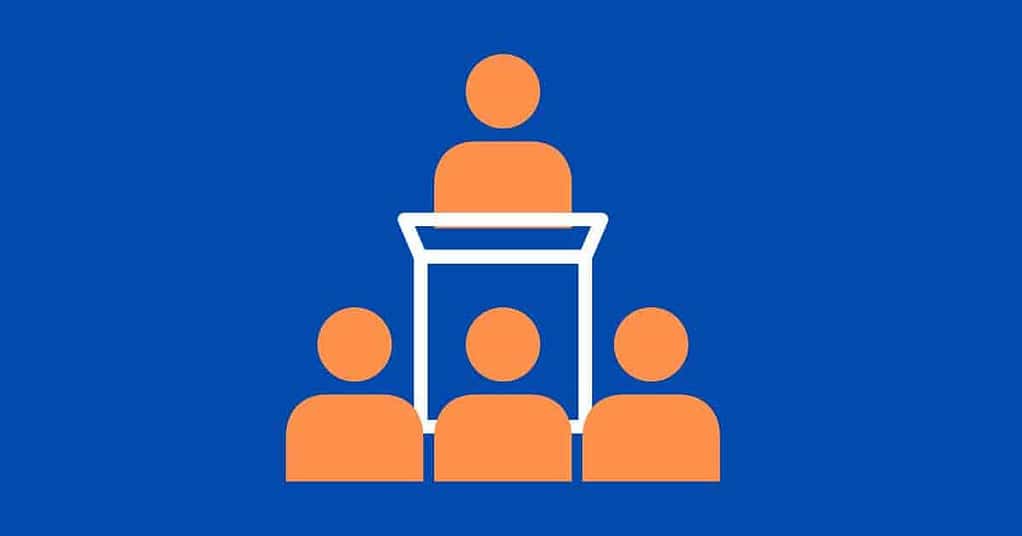
Every post you write is a chance to share your knowledge and ideas with the world. It’s not about bragging – it’s about helping others while proving you know your stuff.
When you learn to blog consistently about your field, something cool happens. People start to see you as an expert. They come to your blog for answers, advice, and insights. It’s like becoming the favorite teacher everyone loves to learn from.
Think of each blog post as a building block of your reputation. Over time, these blocks stack up, creating a solid foundation of trust and credibility. It’s not an overnight process, but it’s incredibly powerful.
Around 65% of buyers say a company’s content impacts their purchase decisions. That means your blog posts could be the reason someone chooses to work with you or buy your product!
One great way to boost your authority is by tackling the tough questions in your field. Don’t be afraid to dive into complex topics. Break them down, explain them clearly, and offer your take.
This shows you’re not just repeating what others say – you’re thinking critically and adding to the conversation.
The best part? As your authority grows, so do your opportunities. You might get invited to speak at events, collaborate with other experts, or even land new clients. Your blog becomes a magnet for exciting possibilities!
So, ready to become the authority in your field? Your blog is the perfect place to start.
3. Generate Leads and Drive Traffic to Your Website
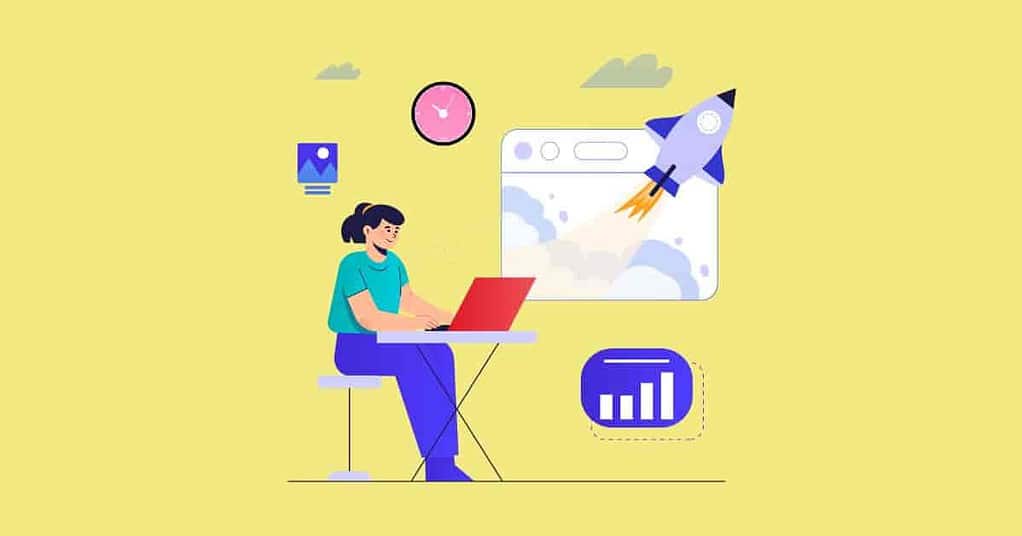
Now that you’re building your authority, let’s turn those readers into customers! Your blog is a powerful tool to bring more people to your website and turn them into fans of what you do.
Think of your blog as a friendly neighborhood shop. Every post is like opening the door and inviting people in. The more helpful and interesting your content, the more likely folks are to stop by and stick around.
Companies that publish 16+ blog posts per month get almost 3.5 times more traffic than those publishing 0-4 monthly posts. That’s like having a constant stream of window shoppers turning into potential customers!
So, how do you make this magic happen? It starts with writing posts that solve problems for your readers. When you help someone out, they’re more likely to trust you and want to learn more about what you offer.
One trick I’ve learned is to create what’s called a “lead magnet.” It’s just a fancy term for something valuable you give away for free.
Maybe it’s a helpful guide, a mini-course, or a handy checklist. Offer it in exchange for an email address, and boom – you’ve got a new lead!
Don’t forget to add a clear call-to-action (CTA) at the end of your posts. It could be as simple as “Want more tips like these? Sign up for our newsletter!” Make it easy for readers to take the next step.
The key is to match your blog content with what you’re offering. If you sell gardening tools, write posts about gardening tips.
This way, you’re attracting the right kind of readers – ones who are likely to be interested in your products. Just remember to keep quality high – rushing out sloppy posts won’t do you any favors.
The best way to turn readers into customers is by being consistent and following blogging best practices. Show up regularly with helpful content, engage with your readers in the comments, and always provide value.
When readers see you as a helpful resource, they’re more likely to become loyal customers down the line.
So, keep writing those awesome posts, solve problems for your readers, and watch as your blog becomes a steady stream of new leads and loyal fans.
Up next, we’ll look at how blogging can help you build a community around your brand. Get ready to make some friends!
4. Build a Community Around Your Brand
Building a community is like creating your fan club! That doesn’t just read your posts but lives and breathes your brand.
When people feel connected to your brand, they become your biggest cheerleaders.
Here’s how to foster engagement with your audience:
- Ask questions: End your posts with thought-provoking questions. It’s like tossing a conversational ball to your readers.
- Respond promptly: When someone comments, jump in quickly. It shows you’re listening and care about their thoughts.
- Share personal stories: People connect with people, not just information. Sprinkle in some personal anecdotes to make your content relatable.
- Create interactive content: Polls, quizzes, or challenges can boost engagement.
Comments and discussions are the lifeblood of your community. They’re not just nice to have – they’re essential.
They provide social proof, showing new visitors that your blog is alive and kicking. Plus, they often spark ideas for future posts. It’s like having a focus group at your fingertips!
Now, let’s talk strategy for building a loyal readership:
- Be consistent: Stick to a regular posting schedule.
- Offer exclusive content: It could be a monthly newsletter with insider tips or early access to new content.
- Encourage user-generated content: Run contests or feature reader stories. It makes your audience feel valued and involved.
Did you know that 70% of consumers feel more connected to brands with CEOs who are active on social media? As a blogger, you’re the CEO of your brand. So get out there and mingle!
When you build a strong community, something amazing happens. Your readers become brand advocates.
They share your content, recommend your products or services, and defend your brand if needed. It’s like having an army of mini-marketers working for you.
Building a community takes time and effort. But the payoff is huge. You’re not just creating a blog; you’re creating a movement. And that’s powerful stuff. Now, get ready to become a word wizard!
5. Improve Your Writing and Communication Skills
Think of blogging as a gym for your brain. With every post, you’re flexing your writing muscles, getting stronger and more agile with words.
Good writing is the bridge between your ideas and your audience. The more you blog, the sturdier that bridge becomes.

Regular blogging is like practicing an instrument. At first, you might hit a few wrong notes. But keep at it, and soon you’ll be playing beautiful melodies with your words. You’ll find yourself expressing ideas more clearly and persuasively.
One of the coolest parts of blogging is finding your unique voice. Maybe you’re naturally funny, or you have a knack for explaining complex ideas simply.
Whatever it is, blogging helps you uncover and refine that special something that makes your writing uniquely you.
Here are some techniques to level up your communication game:
- Keep it simple: Avoid big words when small ones will do.
- Use examples: Paint pictures with your words to help readers understand.
- Break it up: Use short paragraphs and bullet points for easy reading.
- Read it out loud: If it sounds awkward to say, it probably needs rewriting.
As you practice these techniques, you’ll find yourself writing blog posts faster without sacrificing quality. It’s like developing muscle memory for your writing.
The best part? These improved writing skills spill over into other areas of your life. You might find yourself writing better emails, giving clearer presentations at work, or even penning that novel you’ve always dreamed about. Good writing is a superpower that keeps on giving!
Studies show that writing regularly can improve your memory and reduce stress. So not only are you becoming a better communicator, but you’re also giving your brain a health boost!
Remember, becoming a great writer is a journey. With each blog post, you’re taking another step on that path. Embrace the process, learn from your mistakes, and watch as your words start to sing.
Up next, we’ll explore how blogging can open doors to amazing networking opportunities. Get ready to expand your circle!
6. Network and Connect with Like-Minded Individuals
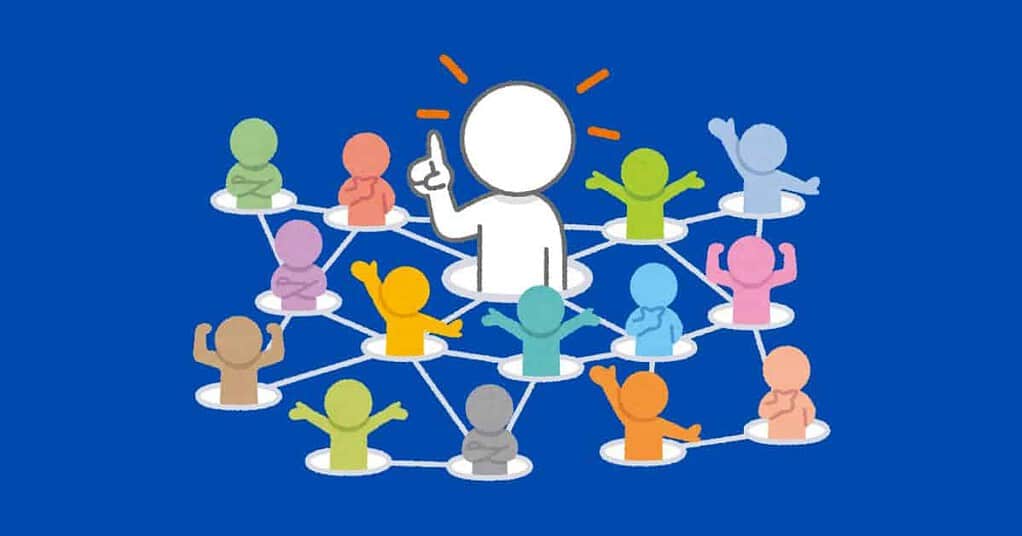
Your blog is like a key that unlocks a world of connections. The key to joining a vibrant community of thinkers, creators, and innovators.
When you blog, you’re not just shouting into the void. You’re joining a conversation. Every post is a chance to meet someone new who shares your interests. It’s like going to a party where everyone wants to talk about the stuff you love.
The cool fact is, that around 60% of bloggers say networking with other bloggers has helped them grow their blogs. That’s a lot of people helping each other out!
So, how do you tap into this network? Start by commenting on other blogs in your niche. Share thoughtful insights. It’s like raising your hand in class – it gets you noticed.
Don’t be shy about reaching out to other bloggers. Send them an email praising a post you loved. Or suggest a topic you’d like to see them cover. Most bloggers love hearing from their readers.
Collaborations are where the magic happens. Guest posting is a great way to start. It’s like being a guest chef at another restaurant – you get to show off your skills to a new audience.
You could also try interviewing other bloggers or experts in your field. It’s a win-win. They get exposure, and you get great content. Plus, you might make a new friend in the process!
Don’t forget about social media. Platforms like X (previously Twitter) and Instagram are great for making quick connections. And blogging on LinkedIn can open doors to professional opportunities you never imagined.
Remember, networking isn’t about collecting contacts like Pokemon. It’s about building genuine relationships. Be helpful, be kind, and be yourself.
The connections you make could lead to amazing opportunities – new jobs, speaking gigs, or even lifelong friendships.
As your network grows, you’ll find your blog growing too. New connections bring new readers, new ideas, and new possibilities. It’s like a snowball effect of awesomeness.
Next up, we’ll explore how all this blogging goodness can turn into cold, hard cash. Get ready to learn about creating passive income streams!
7. Create Passive Income Streams
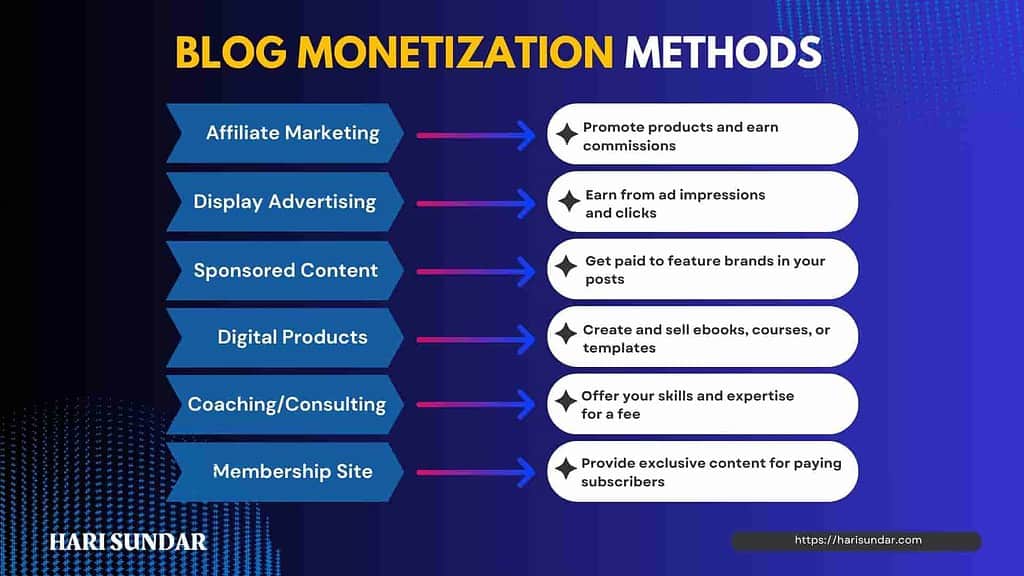
Imagine your blog as a 24/7 cash machine, churning out money while you sleep. Sounds like a dream? Let’s turn that dream into reality by exploring how to monetize your blog!
Let’s start with affiliate marketing, the easiest way to dip your toes into monetization. The best part? You don’t need a massive audience to get started. With just a bit of traffic, you can begin earning.
It’s simple: you recommend products you love, and when someone buys through your link, you get a commission. For example, if you’re a tech blogger, you might earn a 10-20% commission on a software you recommend.
As your traffic grows, you can explore other monetization methods. Display ads are like digital billboards on your blog. They’re easy to set up and can provide a steady stream of income.
The average RPM (revenue per thousand impressions) for display ads ranges from $1 to $3 but can go much higher for several niche topics.
Sponsored content is another great option. Brands pay you to create content featuring their products. A good rule of thumb is to charge $100-$500 per post when you’re starting, depending on your niche and audience size.
Digital products can be your golden ticket to passive income. Ebooks, courses, or printables – create them once, sell them forever. The profit margins are fantastic, often 70-100% after initial costs.
To maximize your blog revenue:
- Diversify your income streams. Don’t put all your eggs in one basket.
- Know your audience. The better you understand them, the better you can serve (and monetize) them.
- Always provide value. Don’t sacrifice quality for quick cash.
- Test and optimize. What works for one blogger might not work for you.
Let’s look at some real-life success stories: Michelle from Making Sense of Cents started her personal finance blog in 2011. By focusing on affiliate marketing and creating her own courses, she now earns over $100,000 per month from her blog.
Pat Flynn from Smart Passive Income turned his architecture blog into a multi-million dollar business. He diversified his income streams with affiliate marketing, online courses, and even a podcast.
Remember, these results aren’t typical, and they didn’t happen overnight. But they show what’s possible with dedication and smart strategies.
As you explore these income streams, you’ll find what works best for you. It’s like finding the perfect recipe – a pinch of this, a dash of that until you create something uniquely yours.
Now, get ready to become the go-to expert in your field!
8. Enhance Your Personal Brand

Building on the income streams we just discussed, your personal brand is what sets you apart and keeps people coming back for more. It’s not just about making money but also making a name for yourself.
Every post is a chance to showcase your personality, your expertise, and your unique perspective. It’s what makes you, well, you!
Consistency is key in brand building. It’s like being a dependable friend – people know what to expect from you. This doesn’t mean being boring. It means staying true to your core values and voice, even as you grow and evolve.
Here’s a powerful strategy: build your blog under your name. It’s what I did with my blog, harisundar.com. This approach gives you the flexibility to pivot and explore different niches without losing your audience.
Think about it – Tony Robbins, Ali Abdaal, and Adam Enfroy all use their names as their brand. It allows them to cover a wide range of topics while maintaining a strong, cohesive brand.
A strong personal brand can open doors you never imagined. It can lead to speaking engagements, book deals, or even your dream job. Companies aren’t just hiring resumes anymore – they’re hiring brands.
Around 82% of consumers are more likely to trust a company when its senior executives are active on social media. So, your blog is your platform to build that trust.
To align your blog with your brand:
- Define your core values. What do you stand for?
- Develop a unique voice. How do you want to sound?
- Create a visual identity. Use consistent colors, fonts, and imagery.
- Share your story. As I said, people connect with people, not just information.
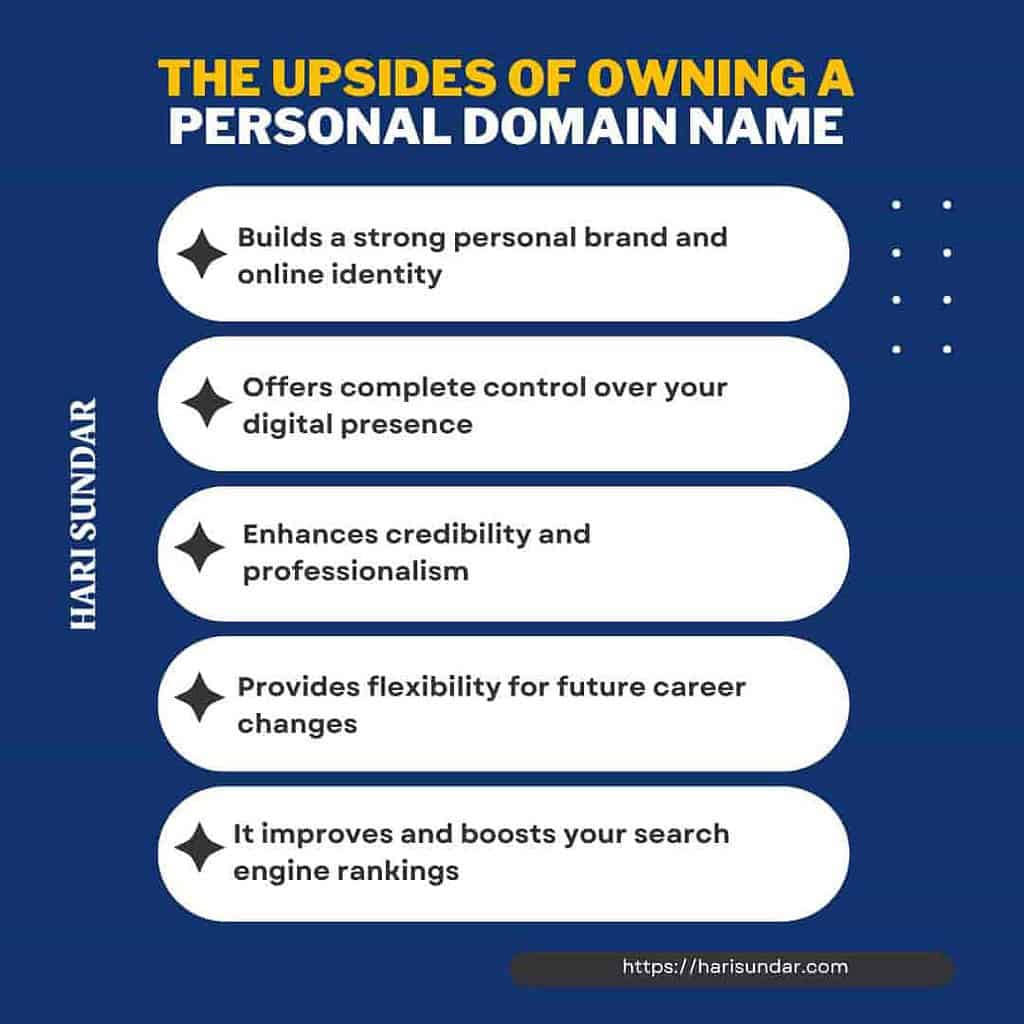
Remember, your brand is more than just your blog. It’s how you present yourself on social media, at events, and in your professional life.
Your blog is the hub, but your brand extends to every interaction you have.
As you build your personal brand, you’re not just creating content – you’re creating opportunities. You’re positioning yourself as an authority, a trusted voice in your field. And that’s incredibly powerful.
How does a personal brand help in scaling your business? Let’s look at it!
9. Startup Scaling vs. Blog Scaling: The Power of Personal Branding
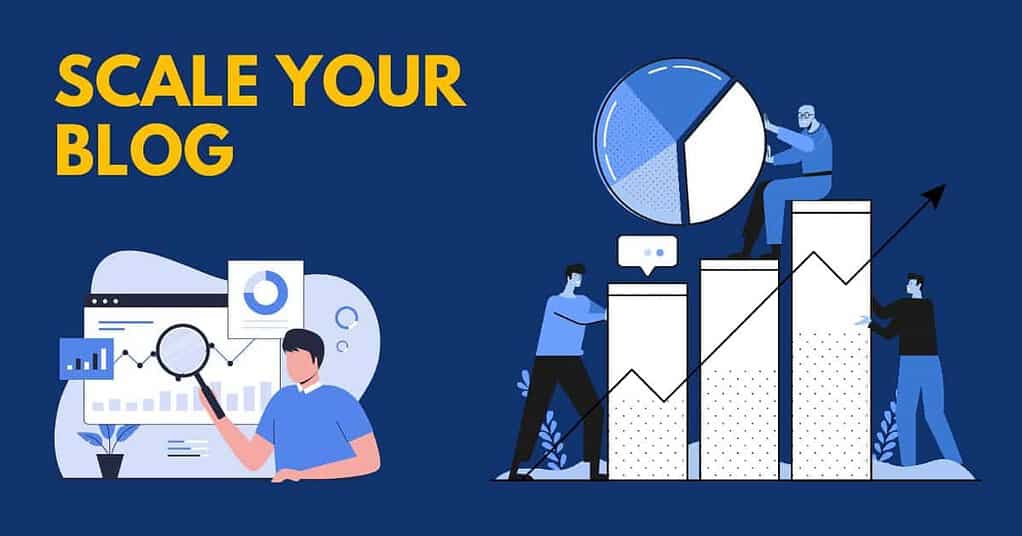
Let’s talk about scaling your business. Imagine you’re choosing between two paths: the startup highway or the blogging byway. Spoiler alert: blogging might just be your express lane to success!
Scaling a startup is like juggling flaming torches. You’re dealing with:
- Fundraising – convincing investors to bet on your idea
- Product development – constantly tweaking and improving
- Hiring employees – building a team from scratch
- Marketing – getting your product in front of the right eyes
- And a ton more…
It’s a complex dance that can leave you breathless.
Now, let’s look at scaling a blog. It’s more like tending a garden. You focus on two main areas:
- Content creation – planting seeds of valuable information
- Link building – nurturing connections that help your garden grow
But, yes, you need the hiring for your blog when it grows into a mini-media site or content marketing agency, but not at the initial stage.
But here’s where it gets exciting. Blogging is about building your personal brand. And that brand can become your secret weapon in the business world.
Take Neil Patel, for example. He started as a digital marketing blogger and leveraged his personal brand to acquire Ubersuggest, a popular SEO tool. He transformed it, and now it’s a cornerstone of his business empire.
Or look at Pat Flynn. His “Smart Passive Income” blog was just the beginning. He used his brand power to acquire SPI Pro and Flynndustries LLC, expanding his reach far beyond blogging.
And let’s not forget Gary Vaynerchuk. He built VaynerMedia from his brand and then acquired PureWow, a women’s lifestyle site. Talk about scaling!
These success stories show how a strong personal brand, built through blogging, can fuel business growth and even lead to acquisitions. It’s all about leveraging your reputation to explore new opportunities.
So, while startup scaling often feels like a high-wire act, blog scaling offers a more stable path. It’s about steady growth, building trust, and creating a brand that opens doors you never even knew existed.
Remember, your blog isn’t just a website – it’s the foundation of your personal brand empire. And in the world of business, that personal brand might just be your most valuable asset!
10. Gain Valuable Analytics And Audience Insights

Building on your brand, it’s time to get to know your audience better. Blog analytics are like having a superpower – they let you see what your readers want.
Start with basic metrics like page views and unique visitors. They’re like a pulse check for your blog. But don’t stop there! Dig deeper into metrics like bounce rate and time on the page. These tell you if your content is hitting the mark.
According to a study by Orbit Media, bloggers who regularly check their analytics are more likely to report strong results.
Use tools like Google Analytics to track where your traffic comes from. It’s like being a detective, following the clues to find your ideal readers.
Pay attention to which posts perform best. It’s like getting a direct line to your audience’s interests. Use this info to shape your content strategy. Give the people what they want!
Remember, numbers are just part of the story. Look for patterns and trends. They can guide your business decisions, from what content to create to which topics to focus on.
As you get more comfortable with analytics, you’ll find yourself making data-driven decisions that can supercharge your blog’s growth. It’s like having a roadmap to success!
11. Develop a Portfolio for Career Advancement

Remember all those posts you’ve been writing? They’re proof of your expertise, creativity, and work ethic. Your blog is like a living, breathing resume that’s working for you 24/7.
Blogging shows initiative. It tells potential employers, “Hey, I don’t just talk about my interests – I actively pursue them.” That’s gold in today’s job market.
When it comes to job applications, here’s how to leverage your blog:
- Include your blog URL in your resume and LinkedIn profile.
- Highlight specific posts that demonstrate skills relevant to the job.
- Use your blog as a talking point in interviews. Share your growth journey.
- Create a “Best Of” page showcasing your top work for easy access.
Many people have turned blogging into career opportunities. Take Mark Manson, for example. He started a personal development blog that led to a best-selling book and a thriving career as an author and speaker.
Or consider Jon Morrow, who used his blogging skills to land a job as Associate Editor of Copyblogger, one of the biggest marketing blogs in the world.
Remember, your blog is more than just a collection of posts. It’s a demonstration of your communication skills, your ability to commit to a project, and your capacity to build an audience. These are skills that are valuable in any industry.
So keep writing, keep learning, and watch as your blog becomes not just a passion project, but a powerful tool for career advancement.
Conclusion
Whew! We’ve just scratched the surface of the incredible benefits blogging can bring to your life. From boosting your SEO to potentially landing your dream job, the power of blogging is undeniable.
When I mentioned starting my blog in 2019, it’s been a wild ride since then, full of growth, opportunities, and yes, even a few stumbles along the way.
But here’s the thing – every post you write is a step towards something bigger. Whether you’re looking to become a successful blogger and make money or simply share your knowledge with the world, blogging opens doors you never knew existed.
As we discussed, it’s not just about writing; it’s about creating connections, building authority, and carving out your own space in the digital world.
So, what’s stopping you? The benefits are waiting – all you need to do is start your blog. Remember, every successful blogger started with that first post.
Who knows? Your next big opportunity could be just a blog post away. Ready to take the challenge of learning to blog? Your future self will thank you!
FAQ Section: Benefits Of Blogging
1. Is blogging still relevant in 2024?
Absolutely! Blogging is more powerful than ever. It’s a key tool for building your brand, sharing your expertise, and creating income streams. In 2024, blogs are essential for SEO and connecting with your audience.
2. How often should I post on my blog?
Consistency matters more than frequency. Aim for 1-2 quality posts per week. It’s better to publish one great article than several mediocre ones. Find a schedule that works for you and stick to it.
3. Can I really make money from blogging?
Yes, you can! There are many ways to monetize a blog – affiliate marketing, sponsored posts, digital products, and ads. It takes time and effort, but with the right strategy, blogging can become a solid income source.
4. Do I need to be an expert to start a blog?
Not at all! Blogging is a journey – you’ll grow your expertise as you go. Share what you know, be honest about what you don’t, and learn along with your readers.
5. How long does it take to see results from blogging?
It varies, but expect to put in at least 6-12 months of consistent effort before seeing significant results. Blogging is a long-term game. Stay patient and keep creating valuable content – it will pay off!
6. Should I focus on SEO or writing for my audience?
Both! Write for your audience first, then optimize for SEO. Create content that answers your readers’ questions and solves their problems. Then, use SEO techniques to help more people find your helpful content.
7. Can blogging help my career even if I’m not a writer?
Definitely! Blogging showcases your knowledge, creativity, and commitment – valuable traits in any field. It can lead to networking opportunities, establish you as an industry expert, and even open doors to new career paths.


